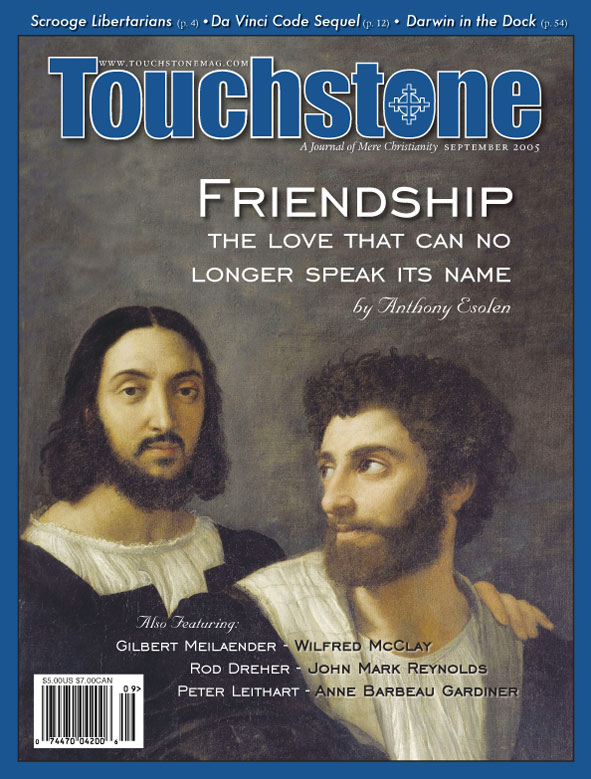Passing on the Right
The Religious Blind Spot of Modern Liberals
I often wonder what advantage publications like the New York Times Book Review see in unabashed identification with political and social liberalism. What place, for example, do the surprisingly strident and crude attacks on President Bush in its pages during the last election have to do with the review of books for an upper-level general audience, a mission that would seem to profit from a reasonable degree of editorial equanimity?
There have been times during the last several years when the magazine has brought me the uncanny sensation of swift backward movement: Suddenly I am no longer reading a distinguished review of books, but underground newspaper juvenilia from the seventies. One would think a more effective approach, given the desire for the largest possible audience, would be for the editors’ liberalism to be expressed in cooler and more understated ways.
As someone who has read the Review for years, my suspicion is that its editors have settled into the mood of those for whom nonliberals simply don’t count, in the sense of being worthy to understand or appeal to. Books as carriers of knowledge and information are for those who can profit by reading. Books as entertainment are of no interest to puritans. So why maintain the useless ruse that the magazine is for anyone but People Like Us? (I suspect this decline into journalistic solipsism among liberals because I have seen it happen among conservatives. It takes a good deal of editorial discipline to keep it from happening.)
The Winning Right
The Right, however, is winning elections, something must be done about it, and the Review has shown itself more than willing to give explicit service for the cause. In this year’s March 6 issue it ran a feature titled, “Left Behind: Can the Democrats Become a Major Party Again?”—a discussion between Peter Beinart, editor of The New Republic, Michael Tomasky, executive editor of The American Prospect, and Katrina vanden Heuvel, editor of The Nation, described by the preface as “three leading voices for liberalism today.”
They agreed that the party’s loss of appeal to a traditional constituency had to be corrected if it is to return to power, but the discussion proceeded in the atmosphere of an interesting ambivalence. They recognized that issues like abortion, homosexual marriage, and the media trash to which current interpretation of the First Amendment is exposing children in particular, loomed large on the agenda of the opposition. There was also a fairly clear understanding that this opposition is primarily “religious.”
But they showed very little knowledge of religion or religious people, and they made no attempt to pursue the implications of the insight. The conversation kept slipping back into political mode, as though the party could regain lost ground by a campaign to inform and appeal to its traditional constituency—labor, various strains of cultural liberal and progressivist—on issues where it has the better plan.
Note Mr. Tomasky’s fascinating remark:
One of the Democratic Party’s problems is that it doesn’t have enough contact with its rank and file. Right-wing people in this country have a place to meet and talk politics—their churches, increasingly megachurches in the exurbs. There’s not a meeting place like that for liberals and Democrats.
One wonders if he’d forgotten the richly government-funded left-wing forums called “universities.”
In any event, there is a brief flash of understanding here: The right wing of present concern tends to be religious. But immediately there is the reflexive garbage-disposal spin one expects from the more sophisticated journalists of the Left: Increasingly the places where the Right does its business are “megachurches in the exurbs.” This is a signal that we are to understand the concerns of the religious right less as faith-issues than protection of the interests of a self-absorbed, culturally sterile, and ideologically confined bourgeoisie. The dump is made with one deft movement, the discussion returns to politics, and the conversationalists remain in their cheerful, or perhaps not so cheerful, blue fog.
Threatening Liberals
A better understanding of the subject would return to religion and deal with the concerns not only of megachurches in the exurbs, but also little churches in the country, and medium-sized churches in the cities, with the concerns not only of conservative Christianity, but also of observant Judaism and Islam—of anyone with a serious belief in God—and with it the moral code these faiths share.
The contributors need to understand just what it is about liberals that threatens these people enough for many of them to leave their natural political homes. They might profit from inquiring why a politically significant number of people who would stand to profit (in the short run) from populist social welfare programs might now shrink from them, understanding there is a price to pay, namely, the installation in offices of power of people who are hostile to their faith.
They might pause to wonder why the feminism and homosexuality they believe all intelligent people see as normal and desirable are regarded by so many religious people as morally detestable, culturally ruinous, and ultimately genocidal—and so simply unacceptable when forced upon them and their families in public institutions, particularly in the public schools. They might consider why these people are angry with judges who keep the Ten Commandments out of the public square, and at teachers, school administrators, and textbook authors whose ideas of inclusivity exclude, deride, or systematically misrepresent people who believe in God.
Mr. Tomasky indicates that part of the job of the new Democratic party chairman would be to “initiate some conversations about the core principles of the party.” This would no doubt be a good idea, but the comment indicates an Olympian remove from the way in which an increasing number of American believers are actually experiencing the power of liberals-in-charge here and now.
It is a long way from “initiating some conversations on core principles” at the upper levels of the party to understanding, much less reacting attractively to, those who are scandalized by distribution of condoms and gay sex manuals in the schools. People of traditional religious conviction fear liberals for their lack of liberality toward those who do not believe as they do, and for their willingness to force their way of thinking, primarily through the action of the courts, upon those who will not yield to persuasion.
The modern liberal, who hates fundamentalism above all things, does not understand that he is an object of dread because he is a nearly perfect fundamentalist. It is perhaps for this reason he finds it easier to talk as though his present problem with vote-getting were a matter of politics more than theology, for when he sets up the lens of religious conviction in which to examine others, he quickly finds himself reflected back in it, and most unhandsomely.
S. M. Hutchens, for the editorsS. M. Hutchens is a Touchstone senior editor.
bulk subscriptions
Order Touchstone subscriptions in bulk and save $10 per sub! Each subscription includes 6 issues of Touchstone plus full online access to touchstonemag.com—including archives, videos, and pdf downloads of recent issues for only $29.95 each! Great for churches or study groups.
Transactions will be processed on a secure server.
more from the online archives
calling all readers
Please Donate
"There are magazines worth reading but few worth saving . . . Touchstone is just such a magazine."
—Alice von Hildebrand
"Here we do not concede one square millimeter of territory to falsehood, folly, contemporary sentimentality, or fashion. We speak the truth, and let God be our judge. . . . Touchstone is the one committedly Christian conservative journal."
—Anthony Esolen, Touchstone senior editor










